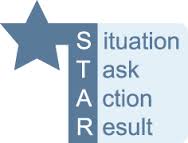
As my last blog post focused on the subject of which competencies employers look for, it makes sense to follow this up a more detailed explanation of how to successfully prove that you have these competencies.
Many of you will have heard of the STAR technique and will perhaps already know that it stands for Situation Task Action Results. Essentially, it is a useful framework to use when trying to evidence competencies to employers. It isn’t rocket science. It is about giving your story a start, middle and end in order to present it in an easy-to-follow way that is comprehendible to someone who doesn’t know you, or your situation, well.
When to use it
The STAR technique is not just about interviews. For any employer who is taking the application form approach (generally speaking, public sector or graduate recruitment) you will need to consider STAR when any competency-based evidence is needed, whether it is through direct questions on the form itself, or when asked to complete a ‘supporting statement’ (in this instance, you should be using the person specification to identify the competencies that you need to provide evidence for).
Competency based questions are easy to recognise. They are asking you to prove that you have a particular work behaviour by describing a way that you have used that behaviour or skill in the past. So typically, the questions will be worded as “Tell me about a time when……” or “Describe a situation when you had to…” STAR shouldn’t be applied to every interview or application form question. It is important that you learn to identify when it is appropriate and when it isn’t.
How to use it
Whether answering verbally in an interview situation, or writing about a competency on your application form, you should break down your competency-based answer into 3 distinct sections:
-
Situation/Task - in terms of point scoring, this isn’t a particularly important part of your answer, but in terms of providing clarity to your response, it definitely is! It can be very confusing as an interviewer if a candidate delves straight into an answer without taking time to explain the context first of all. All it needs is a quick opening line such as “During my time at ABC Training we were working with a client in the sales industry. They wanted us to develop a bespoke training programme to run during their induction process.” Just help them to understand the wider picture.
-
Action - this is the ‘meaty’ part of your answer which will hold most weight with recruiters. You need to describe the actions you took on in order to prove the particular competency that you are addressing. It is not enough just to say “we worked in a team in order to come up with the best solution.” They want to hear, for example, exactly how you worked in this team, what structures you needed to put in place, what particular role you took on, what issues arose and how you overcame them, what skills did you exhibit along the way. Don’t forget that their only way of knowing that you can use this competency in their work setting is to hear about ways you have used it before.
-
Result - this is the end to your story (and the bit that many applicants forget to mention). Don’t leave the recruiter hanging - round it off nicely and, preferably, by showing them a positive result to your actions. This may be about showing success (“The new systems that I implemented were adopted as a standard within the organisation, and are still being used today”) or, preferably, it will show how you have added value through your actions (“As a result of my actions, sales increased within the department by 15% the next month and have continued to rise.”) Obviously the result you are able to give will depend upon your situation - some results are much more easily quantifiable than others - but the important thing is that the story has a clear and positive end to it.
Don’t panic if you feel that your examples aren’t ‘big’ enough. Most of these competencies will be straightforward skills that we use every day and therefore take for granted. They are not looking for you to have changed the world through your actions. What is important is being able to recognise the skills you have and know when it is appropriate to apply them.
Momentum Careers Adviceis based in Welwyn, Hertfordshire, local to St Albans, Harpenden, Hatfield, Stevenage and Welwyn Garden City, but can provide careers advice, guidance and support via Skype, across the UK and beyond.